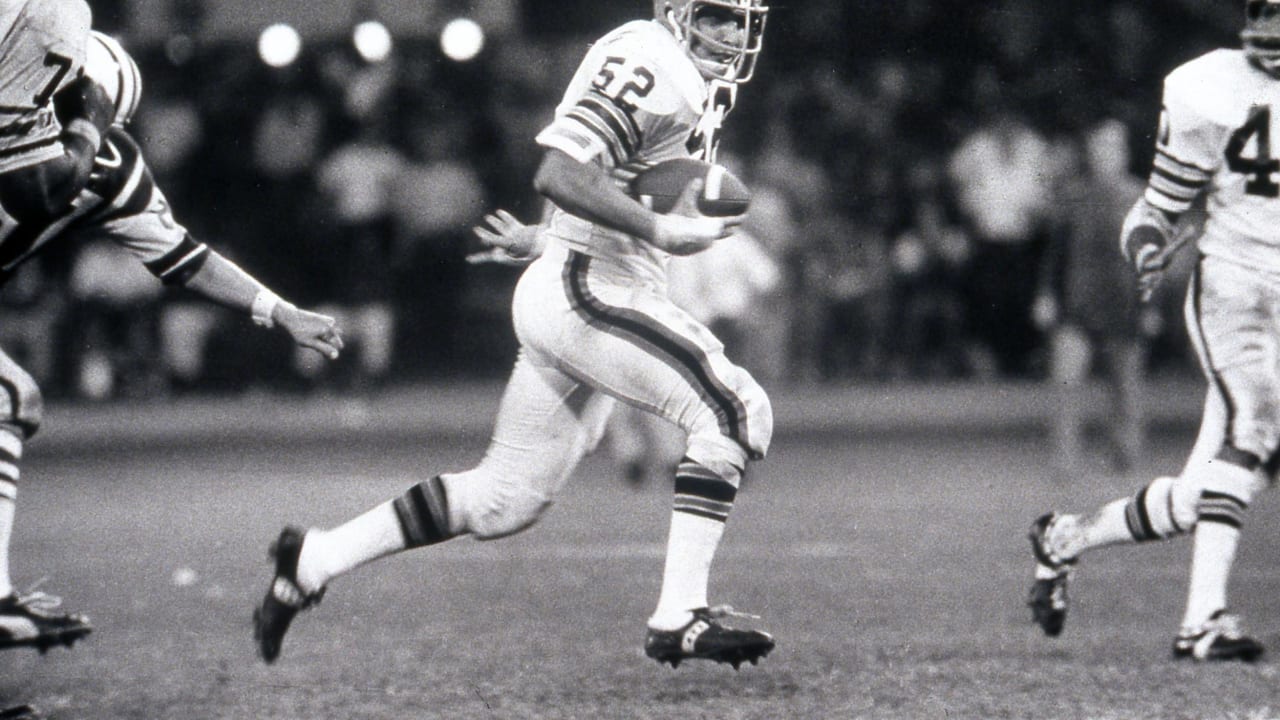When Did They Start Monday Night Football? A Complete Guide To Its Origins And Evolution
**Let me take you back to the fall of 1970, when Monday Night Football made its debut on ABC. Yep, that's right—Monday Night Football, or MNF as we all lovingly call it, has been a staple of American sports entertainment for over 50 years now. It wasn’t just another game; it was a revolution in how we watched sports, bringing football into our living rooms every week during prime time. This wasn’t your average Thursday-night backyard game; this was big-time NFL action under the bright lights of Monday night. But how exactly did it all begin? What made Monday night the chosen night for this iconic event? Let’s dive in and find out.**
Monday Night Football wasn’t just about football; it was about creating an experience. It was the brainchild of Roone Arledge, the legendary TV executive who revolutionized sports broadcasting. Arledge saw the potential of showcasing football in a way that hadn’t been done before—primetime Monday nights, where fans could gather around their TVs after the weekend and kick off the workweek with some serious gridiron action. The idea was simple yet brilliant: bring the best teams to the forefront and let the drama unfold.
As we explore the origins and evolution of MNF, you’ll realize it’s more than just a football game. It’s a cultural phenomenon that has shaped the way we consume sports today. From its humble beginnings in the '70s to its current status as one of the most-watched sports broadcasts in America, MNF has come a long way. So buckle up, because we’re about to take a trip down memory lane and uncover the history of Monday Night Football.
Read also:Discover Corey Feldman Net Worth Age And Personal Life 2023
How It All Began: The Birth of Monday Night Football
It’s hard to imagine now, but back in the late '60s, football wasn’t exactly a primetime attraction. Most games were played on Sundays, and the idea of showcasing a game on a weekday seemed, well, unconventional. That’s where Roone Arledge steps in. He had this vision—why not bring football into people’s homes on a Monday night? It would be different, exciting, and, most importantly, a way to keep viewers glued to their screens.
Arledge pitched the idea to the NFL, and they loved it. The league saw the potential for increased exposure and revenue. The first-ever MNF game took place on September 21, 1970, featuring the New York Jets against the Cleveland Browns. The game was a nail-biter, with the Browns winning in overtime. It wasn’t just the game that made headlines; it was the entire production. ABC spared no expense, bringing in top-notch commentators and using cutting-edge technology to enhance the viewing experience.
But here’s the kicker—Monday Night Football wasn’t just about the game. It was about creating a spectacle. The halftime shows were bigger, the pregame coverage was more extensive, and the overall production value was unmatched. This was a new era of sports broadcasting, and MNF was leading the charge.
The Early Years: Building a Legacy
Key Players in the Early Days
Let’s talk about the people who made MNF what it was in its early years. You can’t mention Monday Night Football without talking about Howard Cosell. Love him or hate him, Cosell was the voice of MNF for its first decade. His sharp wit and no-nonsense commentary became synonymous with the show. Alongside Cosell were Keith Jackson and Don Meredith, who added their own flair to the broadcast.
Meredith, a former NFL quarterback, brought a player’s perspective to the table. His laid-back style contrasted perfectly with Cosell’s intensity, creating a dynamic duo that viewers couldn’t get enough of. Jackson, on the other hand, was known for his smooth delivery and ability to capture the drama of the game. Together, they set the standard for sports broadcasting.
And let’s not forget the teams. In those early years, MNF featured some of the biggest names in football. The rivalry between the Dallas Cowboys and the Pittsburgh Steelers became a staple of the show. These games weren’t just about football; they were about storytelling. Each week, viewers tuned in to see who would emerge victorious in these epic matchups.
Read also:Exploring The Remarkable World Of Ts Luana A Digital Content Creator Extraordinaire
The Evolution of Monday Night Football
Changing the Game: The 1980s and Beyond
As the years went by, MNF continued to evolve. The 1980s brought new challenges and opportunities. Cable television was on the rise, and networks were competing for viewership. ABC had to adapt, and they did so by enhancing the production value of MNF. They introduced new camera angles, instant replays, and graphics that made the viewing experience more engaging.
But it wasn’t just about the technology. The commentators also played a crucial role in keeping viewers hooked. Al Michaels, Frank Gifford, and Dan Dierdorf became the new faces of MNF in the '80s. Their chemistry was undeniable, and they brought a fresh perspective to the broadcast. Gifford’s charm and Dierdorf’s expertise complemented Michaels’ smooth delivery, creating a trio that fans adored.
And then there was the music. The iconic MNF theme song, composed by Johnny Pearson, became an anthem for football fans everywhere. Its opening notes signaled the start of another thrilling Monday night, and it remains one of the most recognizable sports themes of all time.
The Impact on Sports Broadcasting
Setting the Standard for Prime-Time Sports
Monday Night Football didn’t just change football; it changed sports broadcasting as a whole. It proved that sports could be more than just a game—they could be entertainment. The success of MNF inspired other networks to follow suit. Sunday Night Football, Thursday Night Football, and even college football games started airing in primetime, all thanks to the trailblazing efforts of MNF.
But the impact wasn’t limited to sports. MNF also influenced how television networks approached programming. It showed that live events could draw massive audiences, leading to the rise of reality TV and other live broadcasts. In many ways, MNF paved the way for the modern TV landscape we know today.
Key Moments in MNF History
Games That Defined the Show
Over the years, MNF has been home to some of the most memorable games in NFL history. Let’s take a look at a few of them:
- 1971: The Immaculate Reception – The Steelers’ Franco Harris made history with his legendary catch against the Oakland Raiders.
- 1983: The Snowplow Game – The Dolphins’ Jeff Cross used a snowplow to clear the field, leading to a controversial but unforgettable victory.
- 1998: The Music City Miracle – The Titans pulled off one of the greatest comebacks in NFL history against the Bills.
These games weren’t just about the final score; they were about the stories behind them. Each week, MNF gave fans a reason to tune in and see what would happen next.
The Modern Era: MNF Today
Keeping Up with the Times
Fast forward to today, and MNF is still going strong. ESPN took over the broadcast rights in 2006, and they’ve continued to innovate. High-definition cameras, 3D graphics, and social media integration have all become part of the MNF experience. The commentators have changed too, with names like Jon Gruden, Booger McFarland, and Louis Riddick bringing fresh perspectives to the broadcast.
But one thing hasn’t changed—the excitement. Every Monday night, fans gather around their TVs, ready to see who will emerge victorious. Whether it’s a classic rivalry or a showdown between two rising stars, MNF delivers the drama and excitement that football fans crave.
The Cultural Impact of MNF
Beyond the Game: How MNF Influences Culture
Monday Night Football isn’t just about football; it’s about culture. It’s a reflection of our society and how we consume media. In the '70s, it was about bringing people together in front of the TV. In the '80s, it was about technology and innovation. Today, it’s about connecting with fans through digital platforms and social media.
MNF has also played a role in shaping the way we talk about sports. Phrases like “Who dat?” and “Bo knows” became part of the lexicon thanks to MNF. The show has even influenced fashion, with fans donning jerseys and gear to show their support for their favorite teams.
Challenges and Controversies
Facing the Critics
No show is without its critics, and MNF has faced its share of controversy over the years. Some have argued that the focus on entertainment takes away from the game itself. Others have criticized the network’s handling of certain issues, such as player safety and social justice.
But through it all, MNF has remained resilient. It continues to adapt and evolve, addressing the concerns of its audience while staying true to its roots. The show has even used its platform to highlight important issues, such as mental health and racial equality, showing that sports can be more than just a game.
The Future of Monday Night Football
What’s Next for MNF?
As we look to the future, one thing is certain—Monday Night Football will continue to be a staple of American sports entertainment. With the rise of streaming services and digital platforms, MNF has the opportunity to reach even more fans around the world. The show will likely incorporate more interactive features, allowing fans to engage with the broadcast in new and exciting ways.
But at its core, MNF will always be about the game. It’s about the drama, the excitement, and the unpredictability of football. As long as there are fans who love the game, there will be Monday Night Football.
Conclusion: Why Monday Night Football Matters
So there you have it—the complete guide to the origins and evolution of Monday Night Football. From its humble beginnings in 1970 to its status as a cultural phenomenon today, MNF has left an indelible mark on sports broadcasting. It’s more than just a game; it’s an experience that brings fans together every week.
As we’ve seen, MNF has faced challenges and controversies, but it has always risen to the occasion. It has adapted to changing times, embraced new technologies, and remained relevant in an ever-evolving media landscape. And as we look to the future, one thing is clear—Monday Night Football will continue to be a part of our lives for years to come.
So next time you tune in to MNF, remember its rich history and the impact it’s had on sports and culture. And don’t forget to share this article with your friends and family. Together, let’s keep the legacy of Monday Night Football alive!
Table of Contents:
- When Did They Start Monday Night Football?
- How It All Began
- Key Players in the Early Days
- Changing the Game
- Setting the Standard
- Key Moments
- The Modern Era
- Cultural Impact
- Challenges and Controversies
- The Future


